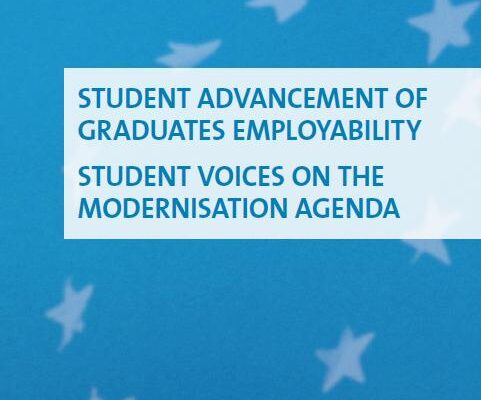
Student Advancement of Graduates Employability: Student Voices on the Modernisation Agenda
Download this file (Adobe PDF document (.pdf), size 1.38 MB)
It is no secret that Europe has faced enormous changes in the past few years and is continuing to do so in relation to youth unemployment. Several initiatives of the European Union in higher education seek to combat this development in Europe. The Europe 2020 and Education and Training 2020 (ET2020) strategies both outline headline targets and benchmarks for higher education policy reform in Europe. To achieve the goals set out in the Europe 2020 strategy and ET2020, the European Commission launched in 2011 a Communication entitled ‘Supporting growth and jobs—an agenda for the modernisation of Europe’s higher education systems’, from now on referred to as the modernisation agenda. The Modernisation Agenda for higher education fixes five key priorities for higher education in the EU to support the main strategies.
Those five key priorities are:
- Increasing the number of higher education graduates.
- Improving the quality and relevance of teaching and learning.
- Promoting the mobility of students and staff and cross-border cooperation.
- Strengthening the knowledge triangle linking education, research and innovation.
- Creating effective governance and funding mechanisms for higher education.
The Modernisation Agenda, while containing several policy recommendations that the students through esu have supported and pushed for, can sometimes be problematic in the way it is implemented. This publication seeks to shed light on how some of the national unions of students across Europe view different aspects of the Modernisation Agenda and its implementation. Those unions were invited to share their views in articles and interviews contained in this publication. These inputs have given us insight into further steps in this process. The experiences across the region are nearly as diverse as the student body itself. Despite this, there are many common themes. Among those, concerns about youth unemployment, the commodification of higher education and access to further studies are highlighted.
This publication is purposefully created to underline some of the issues that exist within and due to the Modernisation Agenda as well as the barriers to its success. While being critical in several aspects, it is meant to be an input to future policy and research to improve those issues. esu is committed to many of the main messages of the Modernisation Agenda and has endeavoured to support them in several ways, including, but not limited to, the many projects that esu has managed and have been funded by the European Commission. Those projects have supported a wide range of policy-focused initiatives, including quality assurance, student-centred learning and equity in higher education.
